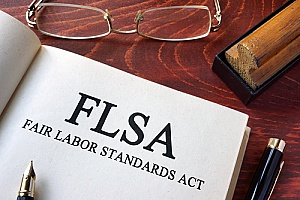 If you are an employee of a business, organization, or the government, it is important to know your rights regarding hours, wages, and overtime that are covered under the Fair Labor Standards Act (FLSA). Likewise, if you own a business or organization, you should know what is required of you regarding the people you employ.
If you are an employee of a business, organization, or the government, it is important to know your rights regarding hours, wages, and overtime that are covered under the Fair Labor Standards Act (FLSA). Likewise, if you own a business or organization, you should know what is required of you regarding the people you employ.
But what exactly is the Fair Labor Standards Act anyway and who is covered under it? Read on to learn more about this unique law and why it was created.
The History of FLSA – When and Why Was It Created?
From the dawn of the Industrial Revolution to the mid-1800s, work hours were typically between 11 to 16 hours long. It was far too common for workers (men, women, and children) to become sick and injured due to incredibly long working hours and poor conditions. Going well into the 1900s, nothing much improved. In addition to the long hours and harsh conditions, workers were paid extremely low wages (especially immigrants seeking work in the United States), while attempts at early labor laws were shot down by Congress as “unconstitutional.”
By the time the stock market crashed in 1929, unemployment had jumped from 3.3% to 8.9%. People were tired of being overworked for little pay and jeopardizing their health by working so long, and many were leaving their jobs as a result. By 1934 it unemployment rose to a staggering 24.9%, signaling that something needed to change.
Three years later, in 1937, a bill was proposed to Congress to cap the number of hours worked during the week to 40 hours and raise the minimum hourly wage (which, at the time, was 40 cents per hour). It also required overtime pay and restricted child labor. A year later that bill become a law, and the rest is history; the Fair Labor Standards Act (FLSA) was born.
An Overview of FLSA – What It Is and Who is Covered?
FLSA is a U.S. labor law that creates the right to a minimum wage, overtime pay (when people work more than forty hours a week) and also bans the vast majority of employment of minors, deeming it “oppressive child labour.” It applies to employees engaged in interstate trade or employed by a business engaged in trade or in the production of goods for trade, unless an exemption from coverage can be claimed by the employer.
 More specifically, FLSA covers any employee working in the private sector for a business or organization that has done at least $500,000 per year in sales and deals in interstate commerce. Interstate commerce includes any shipping of products between states, interacting with customers from or in other states. It also covers employees who work for Federal, State, or local governments.
More specifically, FLSA covers any employee working in the private sector for a business or organization that has done at least $500,000 per year in sales and deals in interstate commerce. Interstate commerce includes any shipping of products between states, interacting with customers from or in other states. It also covers employees who work for Federal, State, or local governments.
Chief among the rights provided by the FLSA is the right to a minimum national hourly wage. As of July 24, 2009, the national minimum wage is $7.25 per hour, and any overtime hours (over 40 hours) must be paid no less than one and one-half times the regular hourly rate (otherwise called “time and a half”).
- FLSA Minimum Wage: While $7.25 is the federal minimum hourly wage, many state governments have their own minimum wage set. If an employer in any given state is required to follow FLSA regulations, they must pay their employees whatever rate is the highest. For instance, if the state wage is $7.50 the employee would receive $7.50 per hour, but if the state wage is $6.50, they would receive $7.25.
- FLSA Minimum Wage for Tipped Workers (PDF): FLSA regulations has also established a minimum hourly wage for workers who receive at least $30 a month via tips from customers. This rate is set at $2.13 for these employees, as their main source of income is not from the employer, but from the employer’s patrons.
- FLSA Overtime: As previously mentioned, non-exempt (workers paid per hour and entitled to overtime pay) employees covered by FLSA are to be paid time and a half for any hours worked over 40 hours. Hours worked on weekends or holidays receive normal rates unless they are overtime hours.
- Hours Worked (PDF): ‘Hours worked’ refer to any hours for which the employees are on the employer’s property (or any other workplace designated by the employer) and are clocked in to perform their duties while there.
- Recordkeeping (PDF): As a part of the requirements to employers under the Fair Labor Standards Act, employers must provide posters outlining their requirements and the rights of their employees in an area that is visible and visited frequently by workers. This will usually be in a break room or training room. Additionally, there are certain standards for what type of information employers keep on record about their employees, including the amount of time they have worked per week, and how much their hourly (or annual) pay is.
- Child Labor: Under the FLSA, children and youth under the age of 16 are prohibited from working in jobs that risk their health and safety. It also lists the conditions under which children (any lower than 16 years old) are not allowed to work at all.
Speak to an Employment Law Attorney
As an employee or employer, it is vital for the health of your organization to know and understand the specific requirements regarding hourly wages and overtime and what is expected of each. This is the only way to ensure a strong working environment and a healthy relationship for both parties. For more information regarding labor laws, what is required of employers, and what employees are covered (and what their rights are), speak to an employment attorney at The Brown Firm PLLC.

